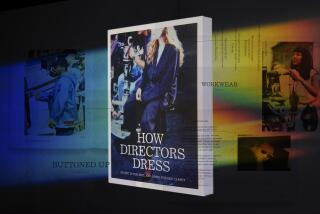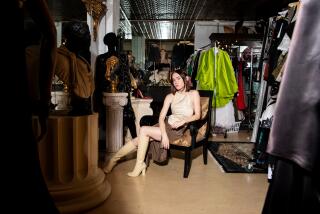‘27 Dresses’
KATHERINE HEIGL is always the bridesmaid and never the bride in this garden-variety wedding-themed rom-com -- except here, never means later, as it should alarm nobody to learn. In this, and in every other way I can think of, “27 Dresses” adheres steadfastly to formula, setting up its complications like bowling pins and resolving them to the utmost satisfaction of everyone involved, no hard feelings, no regrets, absolutely no surprises.
This, presumably, is what we flock to romantic comedies for (if it can be called flocking) -- some kind of ritualistic reassurance that no matter how grim a person’s romantic prospects, love eventually does come to those who wait. As long as they wait in spacious, professionally decorated New York apartments and are attractive enough that it takes the dazzling brunt of a knockout Swede in a microscopic dress to make them look like average Janes by comparison.
As coincidence would have it, Heigl’s character happens to be named Jane, and she lives in a lovely one-bedroom with enough closet space to permanently house a small museum collection of taffeta and tulle atrocities. (No wonder she’s in love with her boss -- he must pay her a fortune for manning his schedule and picking up his dry cleaning.) Her boss, the droopy-eyed George (Edward Burns), has no idea how she feels, but before she can work up the nerve to tell him, he falls instantly in love with her younger sister Tess (Malin Akerman), who wouldn’t you know it happens to be a knockout Swede in a microscopic dress.
Once the George and Tess romance is set in motion, the kind and dutiful Jane has no option but to take charge of their upcoming wedding and plan the whole thing herself, because she has been established as the kind of girl who takes care of everyone but herself and who double-books weddings and spends Saturday nights shuttling back and forth between them. The two dozen or so dear friends for whom she’s ostensibly done the same are only ever seen in fleeting moments -- maybe this is why she hangs on to the dresses; it’s all she has to remember them by. Jane’s only real friend is Casey (Judy Greer), a morose churl whose active sex-and-drinking life apparently leaves her unable to talk above an exhausted drawl or walk in a straight line.
It may be that paradoxes such as these are meant to prime us for the even greater contradictions to come, but it’s more likely that they are by now so entrenched in the genre that they have become functionally invisible to the naked eye. With their strict adherence to a particular kind of formula, studio romantic comedies serve as reassurance delivery systems rather than actual stories, and criticizing them feels a little like taking a Big Mac to task for the quality of the meat. The meat isn’t the point. The point is the familiarity and the homogeny and the taste-masking sauces and the sugar in the bun.
“27 Dresses,” which was directed by Anne Fletcher and written by Aline Brosh McKenna, who also wrote “The Devil Wears Prada,” falls somewhere in the middle of the dozens of hard-to-recall pictures it somehow nevertheless recalls. Its premise not only hinges on a pun, play on words or cliché, it clings to it for dear life. In this case, it’s the old bridesmaid adage, which though it remains tacit for most of the film, haunts it like a poltergeist. She reads bridal magazines to relax, she keeps a Filofax full of clippings and wedding contacts, her favorite writer is a newspaper journalist who writes wedding announcements. She is single-mindedly wedding-mad in that way that looks cute in romantic comedies but would not go un-medicated in real life.
The journalist is Kevin Doyle (James Marsden), whom she meets cute at (where else?) a wedding and who unbeknownst to Jane starts working on a story about her bridesmaid compulsion. No sooner has he pitched her to his editor than he starts to develop feelings. But Jane’s gut tells her that they are a mismatch (she loves weddings, he hates them, let’s call the whole thing off), and she remains unreceptive to his charms until they find themselves stranded in a bar upstate, having been caught in the rain, not quite drinking piña coladas but almost.
“27 Dresses” perks up when Jane and Kevin get to spend some time together; there’s genuine annoyance between them so you can feel the spark. The rest of the relationships feel symbolic at best, with every character reduced to a single defining trait and limited to his or her talking points. Heigl and Marsden are likable and it’s not hard to root for them over a pairing with Burns, whose eco-adventurer-mogul character is as exciting as ski socks. Greer, however, is baffling as the village slut and Akerman gets put through the ringer as the ditzy, self-involved, selfish younger sister who we’re supposed to like, then hate, then like again.
Of course, this is hard to do, considering that she exists solely as a foil for Jane, whose big climactic decision turns out to be a stunningly hostile act of public humiliation that, were this any kind of real film, would have the effect of changing the way we feel about her as a character. Instead, “27 Dresses” dutifully privileges its formulaic plot over its stick-figure characters, slapping a happy ending on a setup that, say, “Happiness” director Todd Solondz could have gone to town on.
Still, there’s something undeniably interesting about how formula has superseded logic, significance or character in so much studio product that certain types of genre stories have become closed circuits, infinite loops. Do we need to keep hearing the same comforting story over and over again like toddlers, or does somebody just think we do? It doesn’t matter. A movie like “27 Dresses” has its pleasures, but to enjoy them it’s best to approach it with the eyes -- and experience, emotional maturity level and love of repetition -- of a child.
“27 Dresses.” MPAA rating: PG-13 for language, some innuendo and sexuality. Running time: 1 hour, 47 minutes. In wide release.


